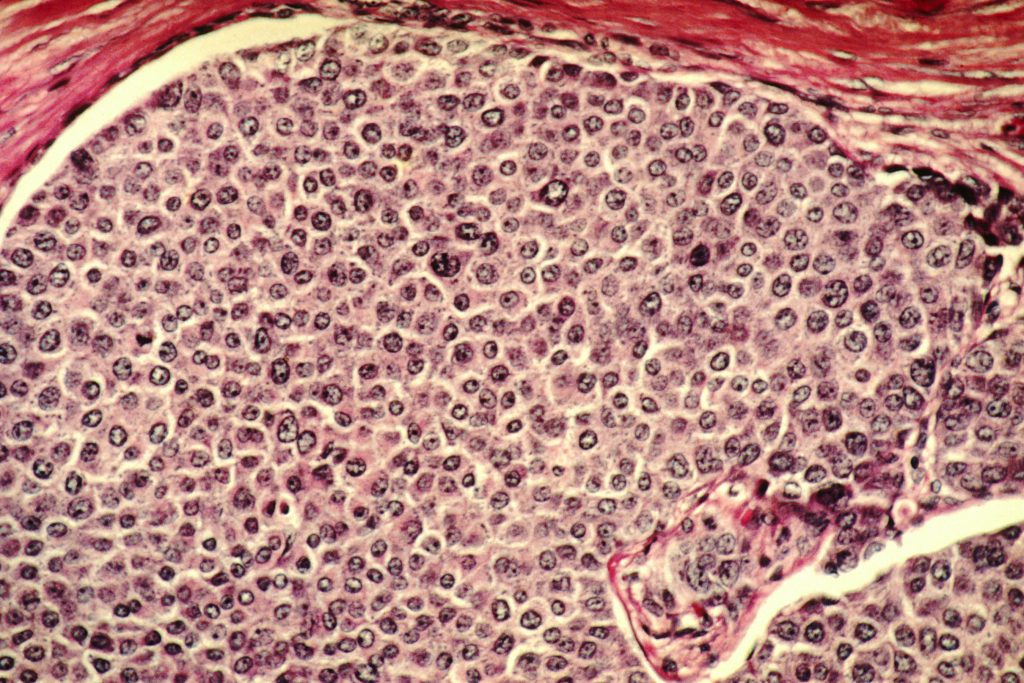 Studies have shown an increase in breast cancer risk among women who have elevated levels of testosterone, reduced levels of sex hormone-binding globulin (SHBG), and therefore elevated levels of bioavailable androgens and estrogens not bound to SHBG. This hormonal profile is associated with obesity and chronic hyperinsulinemia. Lack of physical activity, obesity, and a diet rich in rapidly digestible carbohydrates and poor in fibre favour the development of insulin resistance and hyperinsulinemia. The elevated insulin levels, in turn are related to decreases in plasma and tissue levels of IGFBP-1 and IGFBP-2 (insulin-like growth factor-binding proteins), and this may increase the availability of insulin-like growth factor-I (IGF-I) to bind to its receptors. Like insulin, IGF-I also inhibits the liver’s synthesis of SHBG, whereas both hormones stimulate the ovarian synthesis of sex steroids. Insulin and IGF-I can both enhance the development of breast tumours. Breast cancer risk may be increased in women with elevated plasma insulin levels, and/or with elevated levels of bioactive IGF-I. Hyperinsulinemia and an increased IGF-I bioactivity may be linked to a western lifestyle, overnutrition, excess androgens, and increased breast cancer risk.
Studies have shown an increase in breast cancer risk among women who have elevated levels of testosterone, reduced levels of sex hormone-binding globulin (SHBG), and therefore elevated levels of bioavailable androgens and estrogens not bound to SHBG. This hormonal profile is associated with obesity and chronic hyperinsulinemia. Lack of physical activity, obesity, and a diet rich in rapidly digestible carbohydrates and poor in fibre favour the development of insulin resistance and hyperinsulinemia. The elevated insulin levels, in turn are related to decreases in plasma and tissue levels of IGFBP-1 and IGFBP-2 (insulin-like growth factor-binding proteins), and this may increase the availability of insulin-like growth factor-I (IGF-I) to bind to its receptors. Like insulin, IGF-I also inhibits the liver’s synthesis of SHBG, whereas both hormones stimulate the ovarian synthesis of sex steroids. Insulin and IGF-I can both enhance the development of breast tumours. Breast cancer risk may be increased in women with elevated plasma insulin levels, and/or with elevated levels of bioactive IGF-I. Hyperinsulinemia and an increased IGF-I bioactivity may be linked to a western lifestyle, overnutrition, excess androgens, and increased breast cancer risk.
In animal studies, high insulin in mice caused aggressive growth of breast cancer tumours, while blocking the insulin receptor activation or reducing the high insulin levels caused tumour shrinkage. High insulin may therefore be one of the factors that causes increased breast cancer risk in overweight women and those with type 2 diabetes. We can lower insulin levels with a low glycemic diet, avoidance of sugar and alcohol, and daily exercise.
In another study, mean IGF-I levels were 11% lower among women in the highest tofu intake category compared with the lowest, but the difference in IGF-I levels between the highest and lowest tofu category was only significant among women in Japan. These findings suggest that a diet rich in soy foods and low in meats may be related to lower IGF-I levels.
- Plasma insulin, IGF-I and breast cancer
- Detection of PhIP (2-amino-1-methyl-6-phenylimidazo[4,5-b]pyridine) in the milk of healthy women.
- Can endogenous hyperinsulinaemia explain the increased risk of cancer development and mortality in type 2 diabetes: evidence from mouse models.
- Serum insulin-like growth factor-I levels among women in Hawaii and Japan with different levels of tofu intake.



